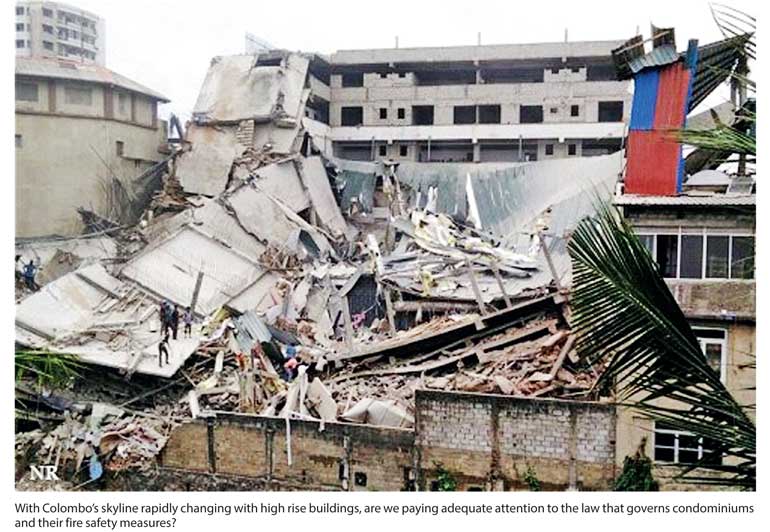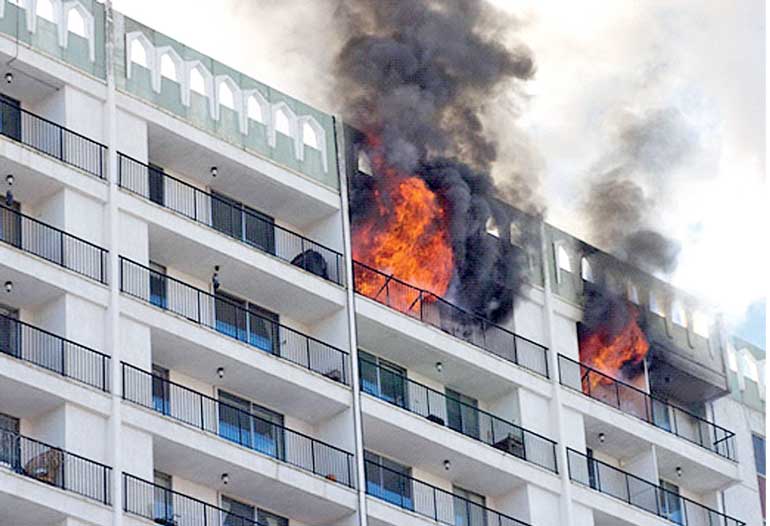Saturday Feb 14, 2026
Saturday Feb 14, 2026
Wednesday, 24 May 2017 00:00 - - {{hitsCtrl.values.hits}}
 Are we waiting for more disasters to find out who could be punished under the Penal Code? Attorneys-at-Law Kirthimala Gunasekera and Ajithaa Edirimanne explain the urgency of looking into the necessary law reform
Are we waiting for more disasters to find out who could be punished under the Penal Code? Attorneys-at-Law Kirthimala Gunasekera and Ajithaa Edirimanne explain the urgency of looking into the necessary law reform
The collapse of the building in Wellawatte is a good eye-opener for the Government towards appointing a competent, professionally-qualified planning team to manage the archaic Condominium Law as most of the condominiums and high rise buildings are without approved plans and deeds. This could lead to a major fire or calamity due to construction defects.
With Colombo’s skyline rapidly changing with high rise buildings, are we paying adequate attention to the law that governs condominiums and their fire safety measures in case of fire?
A person buying a condominium will only look at a glossy brochure. He will not ask whether the law had been followed, plans have been approved, whether deeds can be obtained, whether insurances have been taken, whether there are fire safety measures and whether the Fire Brigade has the capability to reach the floor of the condominium he is interested in.
Even if you do a self-assessment before buying a condominium, very often the answers are vague and negative, plans of the condominium building are not approved by the relevant authorities and the condominiums are existing on a ‘no document’ basis. (The documents necessary to construct and own condominiums according to the law are not approved by engineers or the local authority or they are obtained via extra-legal methods.)Many condominium properties in several areas especially in Wellawatte do not observe any of the aforesaid approval requirements. Hundreds of condos have been occupied without approved plans and title deeds. Developers have collected funds and cannot be contacted to approve the plans and issue deeds to owners.
However in such a ‘no document’ environment, Sri Lanka seems to be blissful ignorant with the boom reaching the edge of the cliff awaiting a catastrophe. The country seems to be enjoying the boom moving like athletes on steroids.
No doubt there are condominiums that are functioning and well-managed by reputed companies according to the law by and large but the situation is not satisfactory as contractors and developers consider themselves above the law. After they complete the construction many contractors are cannot be contacted and foreign contractors may not be in the country to fulfil the approval obligations.
According to the existing law several important approval documents are necessary to construct, own and manage high rise buildings. But who will enforce the law? Merely punishing individuals after a disaster is not a solution for loss of life. The NGOs and the media should play a central role in this matter as this affects the human rights of those occupying the buildings and the others who live close to these buildings.
Approved plans of the buildings should be available, duly approved by the respective local authorities, UDA and the Condominium Management Authority and registered in the respective land registries. This has to be done by all developers. Approvals are also necessary from the multitude of organisations, local authorities, urban councils or Pradeshiya Sabhas. Further, approvals from the Urban Development Authority (UDA) and in addition special approvals may be required from the Central Environment Authority (CEA), Electricity Board (CEB), National Water Supply and Drainage Board (NWS&DB) and Condominium Management Authority (CMA).
1] Approved notarised deeds attested by notaries duly registered in the respective land registries are essential to own the units.
2] Management committee should be appointed to manage the building and to keep the building safe for the owners. Management committee should mange according to a constitution and subsequent purchasers of units need to be given a copy of the constitution. This is one of the most important provisions of the Condominium Law that is neglected and there is no proper organisation to strictly enforcing the law.
1] Electrical connections are temporally repaired by individuals without any supervision
2] The common area including the main entrance have been leased out to third parties by the developer without the consent or knowledge of the unit owners. The common areas are jointly owned by all unit owners and therefore their consent is absolutely necessary to lease or alienate their joint ownership rights.
3] Extensions are made shifting walls to the corridors, blocking access.
4] The water tanks are unclean and are leaking.
5] Construction defects have become a nightmare for some buyers of condominiums. Unscrupulous developers find ways and means to hide defects till the units are sold. It is rare for a buyer to detect construction defects unless he or she has a background in civil engineering or a specialised knowledge in building works.
6] Parking of vehicles blocking entrances and fire hydrants is a common feature.
7] Floor tiles come off and cracks appearing on the walls
Obtaining of approvals is not an easy task; the existing law does not make it easy for developers to construct major multi-storey projects getting all the approvals in time from the organisations due to the cumbersome processes spread out into various Government organisations and the extra-legal methods that have sprung into place.
Sri Lanka has a unique registration system for plans; plans have to be registered twice. This has to be amended. Not only is this procedure cumbersome, it is also costly for the developer.
Quick fix solution – Ignore the law and build without approvals; no one to enforce the law unless there is a disaster.
The majority of the developers refrain from obtaining the required approvals and registration procedures. Pre-sales of units thus take place without registered approved plans issued by the local authority, with the help of beautiful brochures.
Even the banks which mortgage the condominium units disregard the law and register tripartite agreements on the main land in the books of the registry as the plans are not approved and registered. They do not register mortgage bonds for the separate units.
In this lawless environment extra-legal methods to defeat the Condominium law is inevitable.
Some developers resort to a written document called an agreements to sell and get the owners to go into occupation even without obtaining a certificate of occupation. An agreement to sell does not confirm ownership, nor will the document guarantee the safety of the building
The condominium industry is long past its infancy. The principle enactment came into being in 1973 with two important amendments in 1982 and 2003. There are many areas that the law has not been addressed to meet the current demand to build with the due approvals, especially phased condominium property development, “must be built” common elements, and mandatory disclosure requirements for developers, apart from several other important areas.
A new section needs to be added to the current law to cover “planned housing communities” in which too house owners share common elements as in condominium properties. Revising the law, introducing regulations and making the regulator effective with training for its staff are all crucial to make such properties safe.
The law makers need to consult the erudite lawyers who have already researched and revised the law.
Unfortunately in Sri Lanka laws relating to property rights are established by non-lawyers and foreign advisers. (Ajithaa Edirmanne, the author of a book on condominiums, presented to the Law Commission the reforms required in 2014.)
Even if there are new laws, who will enforce the rule of law? Will the authorities apply the penal provisions on those who violate the laws before a fire or before a building collapses?
Over to the NGOs and the lawmakers. We will wait and see.